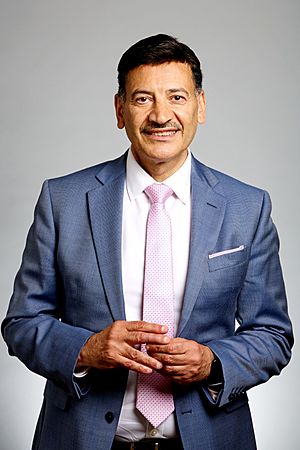Bashir Al-Hashimi facts for kids
Sir Bashir Mohammed Ali Al-Hashimi (born 5 January 1961) is an important computer engineering expert, a teacher, and a leader in higher education. He works at King's College London in the United Kingdom as the Vice President for Research & Innovation and as an ARM Professor of Computer Engineering. He helped start the ARM-ECS Research Centre, which was a partnership between the University of Southampton and ARM, a company that designs computer chips. Sir Bashir also leads a group called Engineers 2030, which works to prepare engineers for the future.
Quick facts for kids
Bashir Al-Hashimi
|
|
|---|---|

Al-Hashimi in July 2023
|
|
| Born | 5 January 1961 |
| Awards | IET Faraday Medal |
| Scientific career | |
| Fields | Computer engineering, energy efficient computing, embedded systems, low power semiconductor chips test |
| Institutions | King's College London, University of Southampton |
Contents
Computer Engineering Work
Bashir Al-Hashimi has done a lot of important work in computer engineering. He has helped design computer hardware and software to work together better. He also focuses on making computer chips use less power and testing them to make sure they work correctly. His research helps create more energy-efficient computers.
In 2009, he started the Pervasive Systems Centre. This center explores how computer systems can be everywhere around us. He has written six books and nearly 400 technical papers about his research.
Big Projects and Discoveries
Sir Bashir led a big project called PRiME from 2013 to 2018. This project, funded by EPSRC (a UK research council), looked into making computers that use very little power, can do many tasks at once, and are very reliable.
He also led the "Holistic battery-free electronics project." This project aimed to create electronic systems that don't need batteries. These systems could be used for things like mobile health devices or sensors that monitor the environment. This work has helped shape how scientists around the world think about powering devices for the Internet of Things (IoT) in a sustainable way.
Leadership in Universities
In 2014, Sir Bashir became a leader at the University of Southampton. He was the Executive Dean of the Faculty of Physical Sciences and Engineering. In 2018, he became the Executive Dean of the Faculty of Engineering and Physical Sciences. He is still a Visiting Professor there.
In 2020, he moved to King's College London. He led the Faculty of Natural and Mathematical Sciences and helped change its name to Natural, Mathematical & Engineering Sciences. In May 2025, he was also appointed Co-Director of the King's Institute for Artificial Intelligence.
Awards and Recognitions
Sir Bashir Al-Hashimi has received many important awards and honors for his work.
- He was made a Knight in the 2025 New Year Honours. This means he can use the title "Sir" because of his great contributions to engineering and education.
- In 2023, he was chosen as a Fellow of the Royal Society (FRS). This is a very high honor for top scientists and engineers.
- He was also elected as a member of the European Academy of Sciences and Arts in 2023.
- In 2020, he received the IET Faraday Medal, a major award in engineering.
- He was appointed a Commander of the Order of the British Empire (CBE) in 2018 for his services to computer engineering and industry.
- In 2014, he received the Royal Society Wolfson Fellowship for his work on energy-efficient and reliable computing systems.
- He became a Fellow of the Royal Academy of Engineering (FREng) in 2013.
- In 2012, he received an award from the European Electronic Design Automation Association for his leadership in electronic design.
- He was also given the Outstanding Service Award by the IEEE Council for Electronic Design Automation (CEDA) in 2012.
- He was elected a Fellow of the Institute of Electrical and Electronics Engineers (FIEEE) in 2009.
- He became a Fellow of the British Computer Society (FBCS) in 2007.
- He was appointed a Fellow of the Institute of Engineering and Technology (FIET) in 2003.
- In 2025, he was elected to the Academia Europea.
Other Important Roles
Sir Bashir has held several important positions outside his university roles.
- He was an elected Trustee on the Royal Academy of Engineering Board until September 2024. He also finished his term as chair of the Academy's Awards Committee in 2023.
- He is a Board Director of the ERA Foundation and a Trustee and Director for the UK Electronics Skills Foundation (UKESF).
- He was part of panels that reviewed research projects for Research England and the UK Research Excellence Framework (REF).
- He was also a Trustee of King's College London Mathematics School until 2023.
 | Madam C. J. Walker |
 | Janet Emerson Bashen |
 | Annie Turnbo Malone |
 | Maggie L. Walker |

